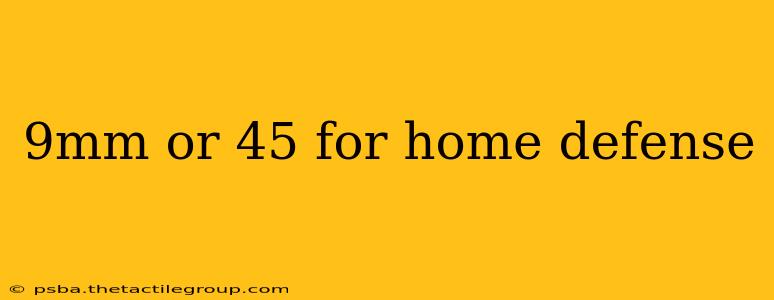The choice between a 9mm and a .45 ACP for home defense is a hotly debated topic among firearms enthusiasts and self-defense experts. Both calibers have ardent supporters, and the "best" choice ultimately depends on individual factors like experience, physical capabilities, and personal preferences. This article delves into the key considerations to help you make an informed decision.
Ballistics: Power vs. Capacity
One of the primary differences lies in the ballistics. The .45 ACP boasts a significantly larger bullet diameter (.45 inches compared to .355 inches for the 9mm), resulting in a larger wound cavity. This translates to potentially greater stopping power, meaning a higher likelihood of incapacitating an attacker with a single shot. However, this comes at a cost.
.45 ACP Advantages:
- Greater stopping power: Larger wound cavity and higher energy transfer.
- Improved penetration in certain situations: Can penetrate barriers more effectively than 9mm in some cases (though this isn't always guaranteed).
.45 ACP Disadvantages:
- Lower capacity: .45 ACP handguns typically hold fewer rounds than 9mm pistols.
- Greater recoil: The heavier recoil can make follow-up shots more challenging, especially for individuals with less shooting experience.
- More expensive ammunition: .45 ACP ammunition tends to be more costly than 9mm.
9mm Advantages:
- Higher capacity: 9mm pistols generally offer significantly higher magazine capacities, allowing for more shots before needing a reload.
- Less recoil: The reduced recoil makes follow-up shots easier and faster, especially crucial in a high-stress home defense situation.
- More affordable ammunition: 9mm ammunition is considerably cheaper than .45 ACP, allowing for more frequent practice.
- More readily available: 9mm ammunition is typically more widely available than .45 ACP.
9mm Disadvantages:
- Lower stopping power (debated): While generally less powerful than .45 ACP, modern 9mm ammunition with advanced designs (e.g., hollow points) significantly mitigates this difference. Many studies show comparable effectiveness in stopping power.
- Potentially less penetration: In certain situations, particularly against barriers, 9mm penetration might be less reliable than .45 ACP.
Practical Considerations for Home Defense
Beyond ballistics, several practical aspects significantly impact the choice:
Shootability:
- Recoil Management: Can you consistently hit your target accurately under stress with the chosen caliber? Practice is key, regardless of caliber, but recoil plays a crucial role in accuracy and follow-up shot speed. If recoil is excessive and impacts your ability to hit your target reliably, a 9mm might be a better choice.
Capacity and Reloads:
- Magazine Size: In a home invasion scenario, having more rounds readily available can be critical. The higher capacity of 9mm pistols offers a significant advantage.
Ammunition Cost and Availability:
- Practice: Frequent practice is paramount for proficient self-defense. The lower cost and wider availability of 9mm ammunition make consistent practice more feasible.
Conclusion: It's About You, Not the Caliber
The "best" caliber for home defense is subjective and depends heavily on the individual. While the .45 ACP offers potentially greater stopping power, the 9mm's higher capacity, lower recoil, and affordability make it a compelling option, especially for those new to firearms or with less physical strength.
Ultimately, the most effective home defense firearm is the one you can shoot accurately and reliably under pressure. Choose the caliber you can handle comfortably, practice extensively, and ensure you understand the laws and regulations concerning firearm ownership and self-defense in your jurisdiction. Consider professional firearms training to hone your skills and make the most informed decision for your personal safety.

